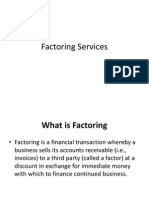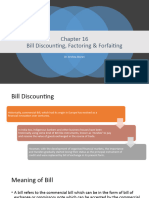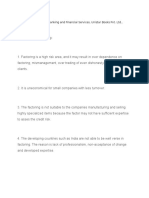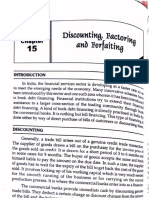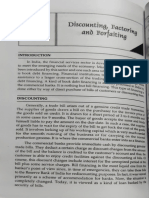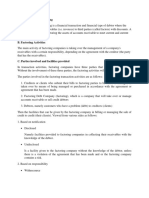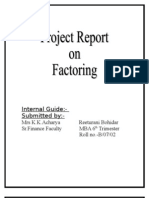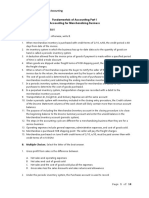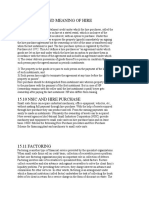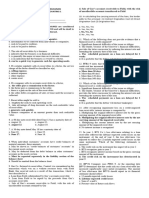0% found this document useful (0 votes)
76 views1 pageFactoring: Factoring Is A New Financial Service That Is Presently Being Developed in India
Factoring is a financial service where accounts receivables are sold to a factor, or financial institution subsidiary of a commercial bank. The factor then takes responsibility for monitoring, collecting, and bearing the risks of those receivables in exchange for commission. Factoring offers businesses advantages like converting receivables to cash without having to worry about repayment, ensuring a steady cash flow pattern, and eliminating the need for a credit department. However, factoring is a relatively expensive source of financing compared to normal lending rates.
Uploaded by
Charu ModiCopyright
© Attribution Non-Commercial (BY-NC)
We take content rights seriously. If you suspect this is your content, claim it here.
Available Formats
Download as DOCX, PDF, TXT or read online on Scribd
0% found this document useful (0 votes)
76 views1 pageFactoring: Factoring Is A New Financial Service That Is Presently Being Developed in India
Factoring is a financial service where accounts receivables are sold to a factor, or financial institution subsidiary of a commercial bank. The factor then takes responsibility for monitoring, collecting, and bearing the risks of those receivables in exchange for commission. Factoring offers businesses advantages like converting receivables to cash without having to worry about repayment, ensuring a steady cash flow pattern, and eliminating the need for a credit department. However, factoring is a relatively expensive source of financing compared to normal lending rates.
Uploaded by
Charu ModiCopyright
© Attribution Non-Commercial (BY-NC)
We take content rights seriously. If you suspect this is your content, claim it here.
Available Formats
Download as DOCX, PDF, TXT or read online on Scribd
/ 1
